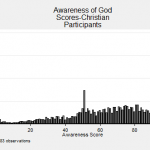In academia, in general, and sociology, in particular, we constantly hear derogatory, prejudicial statements about religion. While it’s easy to just accept this religious prejudice as a given, Christian Smith has written a compelling challenge to it. For his whole essay, click here (page 14). Here are the first several paragraphs:
“The time has come for American sociology to stop being so ignorant and dogmatic about religion. As someone who knows something about the real history, cultures, and organizations of religious traditions, I am regularly appalled by the illiterate prejudices about religion that are routinely expressed by sociologist colleagues. It is embarrassing for our discipline and galling to those who know better.
For example, in a recent Contemporary Sociology book review, the reviewer, a senior sociologist from an Ivy League university, chides a book author for not knowing enough about religion. The reviewer then asserts that the real “net effects of religion and faith” operating “on a macro level” are “a few thousand years of horrible wars, genocide, slavery’s ideology, sexual exploitation, torture, devaluing others as not human, terrorism, and organized hatred.” That opinion is not uncommon—I frequently see and hear it expressed by sociologists.
News flash: this view of religion is so simplistic, ideological, parochial, ill-informed, and historically naïve that it can only be called ignorant or bigoted, or both. It simply parrots the polemics of 18th century skeptical Enlightenment activists and the New Atheists, like Voltaire and Richard Dawkins or Christopher Hitchens (or the combined “Ditchkins”), as if they were historical and scientific fact. It substitutes caricature for scholarship, ideological politics for academic analysis, and understanding. If such sophomoric views were applied to any other area of social life, experts who knew better would laugh and scream…”











